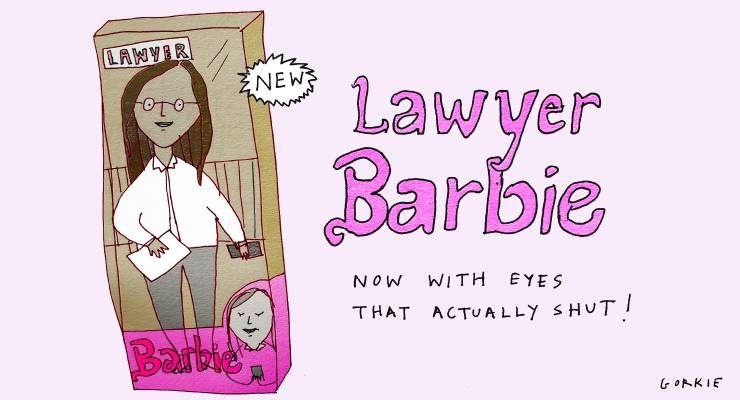
When a young Sydney lawyer’s grandmother passed away, he found himself still receiving calls from his boss during scheduled leave to attend her funeral.
“You still have to be checking your phone every five minutes until you go to sleep,” his colleague, who asked not to be named, told Crikey.
Many lawyers work upwards of 50 hours a week, according to a poll run by legal news source Lawyers Weekly, with 13% saying they work 60-plus hours a week.
However, newly passed “right to disconnect” legislation, aimed at protecting employees from work-related intrusions after hours, has sparked discussion among workplace lawyers about its practical and legal ramifications.
The legal balance
Greens leader Adam Bandt introduced the legislation in March 2023 to ensure employees will no longer be obligated to monitor, read or reply to their employer after work hours, apart for some things like shift changes.
Last year saw the inquiry chaired by the NSW Industrial Relations Commission into the many overworked lawyers from the Office of the Director of Public Prosecutions working beyond their expected workload.
The inquiry ruled on a new award to guarantee that lawyers would no longer be permitted to waive their overtime hours and would hence receive higher rates of pay for any hours worked before 7:30am or after 6:30pm.
Managing partner at Marque Lawyers, Michael Bradley, emphasised the importance of a work-life balance that law firms may lack.
“Work hours were always pretty nebulous,” Bradley told Crikey. “It does have insidious negative consequences particularly for well-being and mental health.”
Bradley started his law journey in 1989 and has seen the gradual dissolution of work-life boundaries influenced by technological progress.
“Because we didn’t have the internet and they couldn’t get you on the landline, you literally switched off. You walked out the door and you’re done.”
Never enough time
For many young lawyers embarking on their careers, navigating the demands of the legal profession can be particularly challenging, especially when it comes to unexpected workloads.
Given the reputation of the legal profession for its demanding hours and periods of stress, the additional apprehension of being on call late into the night and throughout weekends significantly affects the workload of young professionals.
A young lawyer in their first year at a high-profile Sydney law firm, who asked not to be named, described receiving emails at 9pm from their seniors. They said they were worried they wouldn’t be seen “as a team player” if they didn’t complete the requested tasks right away.
“An expectation is that if something is due at midnight, you are available to help,” they told Crikey.
Another young lawyer, employed by the same firm, said management often called outside of work hours.
“The issues happen when there’s a bit of a lack of time management from the senior people above,” they said. “That time pressure gets squeezed on the juniors and all of a sudden work that you didn’t even know about is due within 24 hours.”
In a two-year period at the top-tier law firm, the young lawyer expressed that out of their cohort of 30 juniors, only 18 remain.
“The consequence [not replying after work] is you fall out of favour with your boss, you’re viewed as unreliable, you’re known as somebody who does not prioritise the work or takes it seriously,” they said.
Canary in the coalmine
Enforcing the “right to disconnect” legislation could be tough for law firms because legal work often requires immediate attention, even outside regular hours.
Predicting when urgent matters arise or when clients need help is difficult, making it challenging to set strict limits on after-hours communication.
Bradley emphasised the need to establish fair rules and expectations in the legal field, rejecting the idea of strict 9-to-5 schedules as unnecessary in their industry. He believes that if an employer has problems in setting healthy boundaries in a firm then they may have bigger problems.
“It’s really up to us to set the norms, expectations, what do we expect from people, and what is reasonable.”
The young lawyer believes big firms are not looking to hire more staff due to the fear of losing profit for the business. This will eventually lead to pressure on junior lawyers to keep up with heavy workload.
“If you have more lawyers that means that there is less crunch on juniors,” they said.
Bradley emphasised the right to create a safe environment in fostering young lawyers.
“The heavier responsibility is on us as employers to allow for a healthy workforce as one that has a life outside work and is able to maintain sensible boundaries.”








The obvious way to deal with this for lawyers – and other professions – is to acknowledge in the EA that work is expected after hours, and to pay a premium for such work.
Yes, lawyers could be paid for the overtime that they are doing or given time in lieu for after hours work. Because it is true that sometimes the work can’t wait, this is the nature of practising law.
Although then there is the workplace culture issue of actually claiming the overtime/being able to take the time in lieu.
I work in a law firm (not for profit) that is pretty good with work life balance now. When we’ve raised unpaid overtime through our delegates, the answer from management is that our workloads need to be manageable within 9-5. With agitation from our delegates and those at other CLCs, this seems to actually be happening. The key is that management have bought into keeping our workloads relatively manageable, when they don’t buy in, it’s a different story.
Rural paramedics work ‘on call’ or ‘EA’. I’m sure the police do as well because in many smaller towns, there are no night shifts. The remuneration is (sometimes) worth the interruption of evening meals or sleep.
I’ve read several stories of people who have been contacted out of hours and have asked what the going overtime rate is and never been contacted again about after hours work. (They’ve not lost their job either). So a right to disconnect is needed but it’s about time businesses start to realise they need to better manage their resources within operating hours or pay the appropriate rates for work outside of hours.
Not doing so is just another form of wage theft by stealth.
In law, “EA” stands for Every Available (hour).
If by “EA” you mean Enterprise Agreement, I think you will find that many junior lawyers are considered to be “professionals” and, as such, are paid a salary, and those working class things such as hourly pay (not billable) rates, overtime payments and enterprise agreements are not meant for them. I stand to be corrected, and would gladly be so, but that has been my experience as a consultant in scientific and technical services, where lawyers are often my clients. Sad but true, lawyers don’t know everything and need to ask for help sometimes.
Correct, at least in private practice
Most employed medical professionals in Australia work on an hourly/daily rate, plus on call and call back for the essential services required out of hours.
This is absolutely achieveable in the law, but there are obviously vested interests that oppose it.
Given lawyers usually charge in well defined and measured time increments, it should be utterly trivial for them to account for the amount of work done and when, and either appropriately remunerate or offer time-off-in-lieu to the relevant employees.
The life of a junior lawyer in big law is miserable. Most firms now require around 2,000 hours billed to clients per annum. To bill 2,000 plus do all the rest of your admin, meetings, compulsory professional development, etc., you have to work at least 2,500 hours. And to make partner (which maybe 1 in 10+ graduates will achieve – the rest drop out or burn out or both), you have to be amongst the highest billers, while maintaining standards of quality exceeding all your peers.
The great novel, “Hell has Harbour Views”, written by a Sydney lawyer who is now a silk, can be found in the non-fiction section.
I believe that one of the professions most severely affected by AI will be the lawyers. Within a decade most lawyers will be begging for more work. Accountants too.
Lots of professionals and others provide availability to their employers after normal business hours because that is the nature of the work. They are paid to be on call and for hours worked during that period.
It is disingenuous for law firms to claim that their needs are in any way special.
They have simply been getting a free ride. If they have to cling to an annual salary model rather than move to per diem payment (as is the norm in much of the medical profession, for instance), then they should be prepared to increase the overall offer if it is to include out of hours availability.